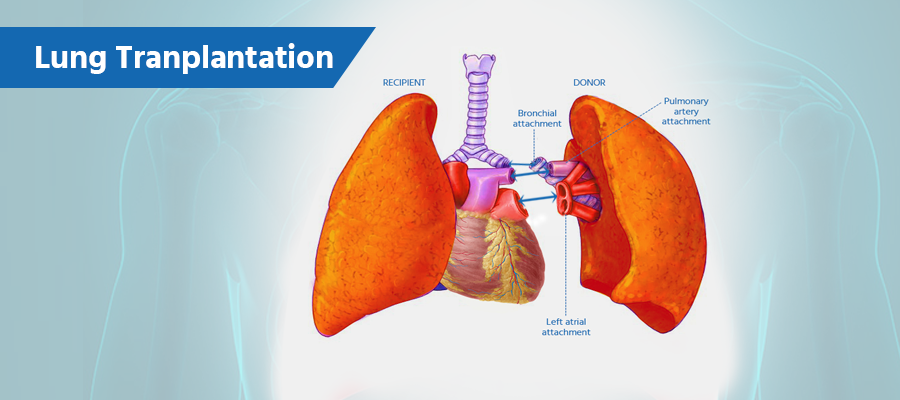Lung Transplant at Affordable Cost in India
A lung transplant or pulmonary transplantation is a surgical operation in which a healthy lung of a donor partially or fully replaces the damaged lungs. This procedure is done to improve the overall health of a patient. However, lung transplant surgery has many complications along with the risk factors.
Most lungs for transplantation surgery are taken from deceased organ donors, and this kind of lung transplantation is known as a cadaveric transplant. Healthy individuals who do not use tobacco can be a good match to donate part of one of their lungs.
Secure your health with a second opinion. Make informed decisions and book your appointment today!
Get A Second OpinionLung Transplant Cost In India | Price Range
- The cost of a lung transplant generally varies according to the city and the hospital one chooses.
- The cost of lung transplant surgery in Hyderabad, Vizag, and Nashik differs widely based on various factors.
- The typical cost of lung surgery is between INR 13,00,000 to INR 25,00,000, depending upon the type of surgery.
- The minimum cost of lung transplants in Hyderabad is Rs 12,00,000, and the maximum is Rs 25,00,000.
| City | Cost Range |
|---|---|
| Hyderabad | Rs 12,00,000 to Rs. 25,00,000 |
How to Prepare For Lung Transplant Surgery
- Once it is decided to have a lung transplant, patients must undergo a series of tests to evaluate overall health.
- The doctor will thoroughly explain the benefits and risks involved with the surgery.
- After this, one has to find a liver donor for the lung transplant surgery.
- When a compatible donor’s lungs become accessible, the doctors will make the arrangements for the operation.
How is Lung Transplant Surgery Done?

- The patient will be brought to the operating room and given general anaesthesia to put into a deep sleep.
- The surgeon will make an incision in the chest, and the diseased lungs will be partially or fully replaced (depending upon the medical problem) by the healthy lung of a donor.
- The surgeon will fix the airways and blood vessels and close the incision.
- After the surgery, the patient must stay at the hospital for a few days or weeks for a health assessment.
- The patient will be discharged from the hospital once the doctor reviews the medical reports and decides that the patient is fit for discharge.
Types of Lung Transplant Surgery
Single lung transplant: In this procedure, one lung transplant is done.
Double lung transplant: In this procedure, both lungs are transplanted.
Bilateral sequential transplant: In this procedure, both lungs are transplanted one at a time. It’s also called bilateral single.
A heart-lung transplant involves both the lungs and the heart being donated by a single donor.
Our Surgeons
At Medicover, we have the best team of lung transplant surgeons and doctors who provide comprehensive care and treatment to patients.
Why Choose Medicover for Lung Transplantation?
- Medicover is the best multi-speciality hospital, providing 24x7 comprehensive care and treatment to patients under one roof.
- We constantly pushing the lengths to seek solutions for better patient care.
- We have the most advanced technologies and experienced doctors with the latest facilities and modern infrastructure.
- Our doctors can help by providing a second opinion and alternate treatment options.
Ready to take control of your health journey? Book your appointment now and start your path towards wellness today!
Book an AppointmentFrequently Asked Questions
Lung transplant depends on various factors such as the severity of the lung disease, overall health, and
ability to tolerate the procedure and post-transplant medications. A thorough evaluation by a transplant
team is necessary to determine eligibility.
Lung transplant depends on various factors such as the severity of the lung disease, overall health, and ability to tolerate the procedure and post-transplant medications. A thorough evaluation by a transplant team is necessary to determine eligibility.
A lung transplant may be considered for conditions such as chronic obstructive pulmonary disease (COPD),
cystic fibrosis, pulmonary fibrosis, pulmonary hypertension, and other severe lung diseases that haven't
responded well to other treatments.
A lung transplant may be considered for conditions such as chronic obstructive pulmonary disease (COPD), cystic fibrosis, pulmonary fibrosis, pulmonary hypertension, and other severe lung diseases that haven't responded well to other treatments.
The lung transplant surgery duration depends on factors like the complexity of the case and whether one
or both lungs are being transplanted. On average, the surgery can take anywhere from 4 to 12 hours.
The lung transplant surgery duration depends on factors like the complexity of the case and whether one or both lungs are being transplanted. On average, the surgery can take anywhere from 4 to 12 hours.
Like any major surgery, lung transplant surgery carries risks such as infection, bleeding, blood clots,
and complications related to anesthesia. Additionally, there's a risk of rejection of the transplanted
lung(s) and side effects from immunosuppressive medications.
Like any major surgery, lung transplant surgery carries risks such as infection, bleeding, blood clots, and complications related to anesthesia. Additionally, there's a risk of rejection of the transplanted lung(s) and side effects from immunosuppressive medications.
The success of lung transplant surgery varies depending on factors. Survival rates have improved over the
years, and many patients experience improved quality of life.
The success of lung transplant surgery varies depending on factors. Survival rates have improved over the years, and many patients experience improved quality of life.


